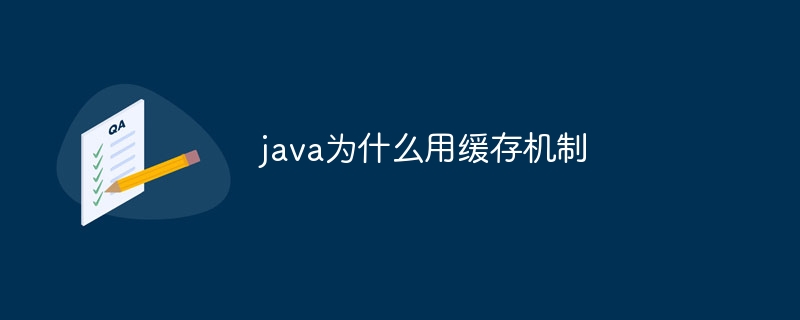
The reasons why Java uses the caching mechanism are: 1. Improve performance; 2. Reduce repeated calculations; 3. Improve concurrency performance; 4. Improve availability and scalability; 5. Reduce database load; 6. Follow the best practices Best practices, etc. Detailed introduction: 1. Improve performance. Caching can reduce the number of accesses to the original data source, thereby reducing network delays, I/O operations and database queries and other expensive operations; 2. Reduce repeated calculations in computing-intensive applications. , some calculation processes may be very time-consuming, and the calculation results may not change frequently; 3. Improve concurrency performance, etc.

The operating system for this tutorial: Windows 10 system, DELL G3 computer.
There are many reasons why Java uses the caching mechanism. Here are a few main reasons:
1. Improve performance: Caching can reduce the number of accesses to the original data source, thereby reducing network delays, I/O operations, database queries and other expensive operations. By storing commonly used data or calculation results in memory or other fast storage media, the overhead of repeated calculations or queries during application execution can be reduced, thereby improving application performance and response speed.
2. Reduce repeated calculations: In calculation-intensive applications, some calculation processes may be very time-consuming, and the calculation results may not change frequently. In this case, the calculation results are cached and can be obtained directly from the cache when needed later without repeated calculations, thereby saving computing resources and time.
3. Improve concurrency performance: In a multi-threaded or high-concurrency environment, the cache can be used as a shared resource to avoid competition and performance problems caused by multiple threads accessing the same data source at the same time. By caching shared data, you can reduce the number of accesses to the original data source and improve concurrency performance and response speed.
4. Improve availability and scalability: The cache can be used as a layer in the system to place commonly used data or services closer to the user, thereby reducing network latency and load balancing overhead. At the same time, the cache can also serve as a layer of buffering in the system. When the back-end system fails or the load is too high, the cache can continue to provide services, thus improving the availability and scalability of the system.
5. Reduce database load: In web applications, the database is usually one of the bottlenecks. By using caching, you can reduce the number of accesses to the database, thereby reducing database load and response time. This is especially important for high-concurrency, high-traffic web applications.
6. Follow best practices: Caching is a common technology in computer science and is widely used in various systems and applications. Many best practices and experiences show that proper use of cache can improve system performance, availability, and scalability. Therefore, using caching is an industry standard practice.
In short, Java uses the caching mechanism to improve the performance, concurrency and availability of applications. By storing commonly used data or calculation results in memory or other fast storage media, reducing the number of accesses to original data sources and repeated calculations, and avoiding competition and load balancing overhead, caching can effectively improve the response speed and overall performance of the system. .
The above is the detailed content of Why does java use caching mechanism?. For more information, please follow other related articles on the PHP Chinese website!
